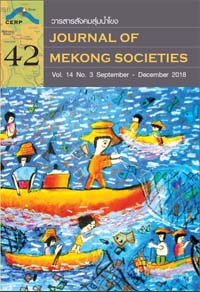Hydropower Dams on the Mekong River: Changes in Food Security and Chiang Khong Women’s Adaptation
Main Article Content
Abstract
The Chinese government has created several hydropower dams along the upper Mekong river. These dams have caused water erratic fluctuation, which has had social impacts on the lower Mekong River communities. This article aims to understand the impacts on local ways of life, especially women’s role in adapting to hydropower dam construction that has caused food insecurity. The area of study is Chiang Khong, Chiang Rai province for the case study in Thailand. This study adopts the human security concept to analyze circumstances of women’s lives from the change in food resources in local communities due to the impacts of hydropower dams. Also, political ecology is added to understand human resource accessibility relations in the area. Questionnaire surveys and in-depth interviews of local people in Chiang Khong were applied for data collection from Augustto December 2017. The findings show the impacts of dam construction in China that changed the river’s ecosystem and resulted in resource shortages. The change in natural resources along the Mekong river has resulted in livelihood changes; thus, women have to adapt for their family’s survival.


